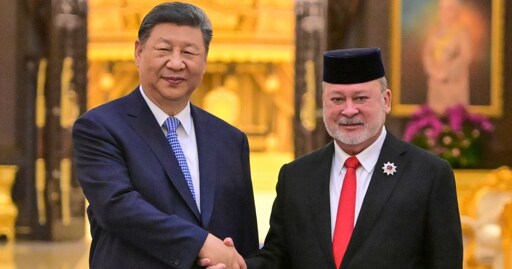China’s President Xi Jinping has arrived in Malaysia as part of a Southeast Asian tour which is seen as delivering a personal message that Beijing is a more reliable trading partner than the United States amid a bruising trade war with Washington.
Xi’s three-country tour and his “message” that Beijing is Southeast Asia’s better friend than the truculent administration of US President Donald Trump comes as many countries in the 10-member Association of Southeast Asian Nations (ASEAN) bloc are unhappy with their treatment after the US imposed huge tariffs on countries around the world.
“This is a very significant visit. You can read many things into it,” said Mohamed Nazri Abdul Aziz, a former Malaysian ambassador to the US and minister of legal affairs.
“Under PM Anwar, Malaysia is getting very much closer [to China]. It’s a good thing,” he added, noting that “in the long run”, Washington’s “influence will be reduced”.
Washington hit Malaysia with a 24 percent trade tariff, accusing it of imposing a 47 percent tariff on US imports, a rate that Malaysian officials rejected.
Xi’s visit to Malaysia is in part an effort to “reinforce” the view that China can “offer to bypass America”, said James Chin, professor of Asian studies at the University of Tasmania in Australia, via a different international order such as BRICS – the 10-country intergovernmental organisation comprising Brazil, Russia, India and China, among others.
“Basically, this is all architectured to build a new international order… Trump has given China the excuse to push harder amongst countries around the world, especially developing countries,” Chin said.
Of the three countries Xi chose to visit this week, analysts said Malaysia is deemed to be the most important for China, given its sizeable 32 million population, its developing high-tech base and its current chairmanship of ASEAN. China is also Malaysia’s largest trading partner since 2009, and in 2024, China-Malaysia trade reached $212bn.
“China hopes to jack up trade with Malaysia, which will make up for the expected downgrading of exports to the US,” said Willy Wo-Lap Lam, a senior China analyst with the US-based Jamestown Foundation and author of the book, From Confucius to Xi Jinping.
“Politically, Malaysia has a lot of influence among all 10 ASEAN states,” Lam said. “Including how countries that have territorial disputes with China in the South China Sea should respond to Beijing’s aggressive tactics in bolstering its hold over.”



https://en.m.wikipedia.org/wiki/Democracy_in_China I’m just going to leave this here.
Cool, none of that refutes anything I have said, more affirms what I said and explains that westerners do not approve of the system that the Chinese have implemented by and for themselves, and have achived far higher rates of satisfaction than western countries do. Since you haven’t actually countered anything I said, I’ll just re-assert my comment:
I want to keep stressing and asking, what mechanically would China have to change in order for you to accept the system that the Chinese have implemented by and for themselves, and approve of at rates exceeding 90%?
Frankly, it’s insulting to assume I somehow haven’t been exposed to the Wikipedia page yet when that’s inevitably the first exposure anyone in the west tends to get to subject matters like that. The articles I linked go far more into the actual structures at play and don’t focus on a purely US/EU-centric POV, but includes Chinese perspectives as well.
I see lots of silence after this comment. Looks like a debate pervert lost some steam.
They have avoided responding to me despite starting to respond to others, so either they blocked me or gave up. Whichever it is, I think it helped let my point sink in.